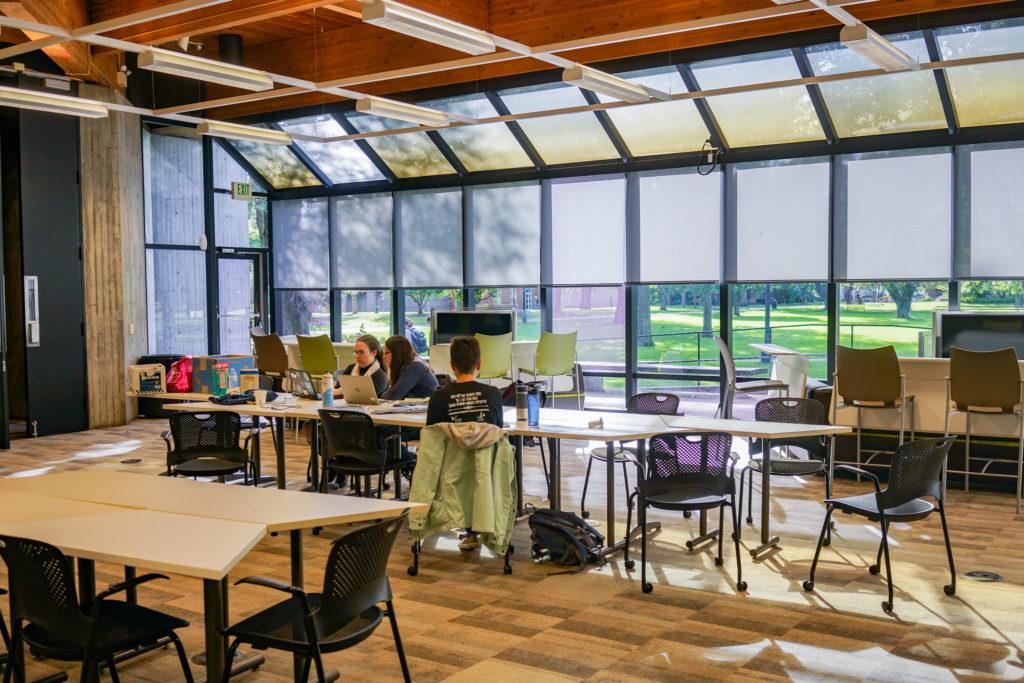By Wini Austin
austinwi@grinnell.edu
It’s bright, it’s green and it’s filled with educational technology. The Digital Liberal Arts Laboratory, also known as DLab, is an often-overlooked tech treasure chest, located on the first floor of the Forum, next to IT services.
On one end of the DLab’s open floor plan lie two lime green trapezoidal couches. Arguably the signature interior design elements of the space, these couches add a zingy pop of color against the room’s muted color palette. From them, students can hook up their laptops to the screens in front and view media, work on presentations, or even play video games.
Though decidedly fluorescent, the DLab’s light fixtures are elegant, casting a cheerful glow on the space. Most of the day, however, the overhead lights are unnecessary; the space has floor-to-ceiling windows and an abundance of natural light, making it a peaceful, scenic environment to churn out a reading or two after class. With its panoramic views of the commencement lawn, it’s also a prime people-watching spot.
In addition to four flat-screens monitors and six desktop computer stations stocked with software, the DLab is the only place on campus where students can rent laptops. Although they’re only available for use within the lab, these laptops can be lifesavers in the case of personal laptop emergency.
In the back, behind the teaching whiteboards, a 3D printer is available for use by any student. iPads are also available for student use, and unlike the laptops, students can take them outside the DLab and use them for the semester.
The DLab is also home to the Grinnell College Immersive Experience Lab (GCIEL) which explores the use of virtual reality and mixed reality experiences in the liberal arts curriculum. Here, students can help build and experiment with the various VR projects being developed at Grinnell.
Dr. Katie Walden, a digital liberal arts specialist at the DLab, sees it as the ultimate collaborative workspace.
“Someone might be doing a project meeting, and another student might be back there in the VR lab … I love that at any given moment there’s different kinds of creative work happening,” she said.
Walden likened it to a technological library space: free and accessible to anyone who wants to use it. “We provide resources for everyone. It doesn’t matter what course you’re enrolled in or what your major is … We’re an academic technology team so we’re in the business of providing resources for everyone. It’s a way of leveling the playing field,” said Walden.
You don’t need to be with a class to take advantage of the space; although the staff depart at 5 p.m., the space and its technology are available to students until midnight.
Today, the DLab is far from the most populated space on campus, but back in the day, the Forum was the place to be. It was like the Grill and the game room, packed into a smaller, cozier space. Where there’s a conference room now, there used to be pool tables, and where the DLab offices are today, was a food venue.
If you dig into the college archives, you can find pictures of students assembled in the Forum for a Concerned Black Students meeting, or hundreds packed into the space for an emergency SGA meeting after the Kent State shootings in 1970.
One of the last remnants of the old Forum is the beautiful hardwood ceiling, which hints at the cozy atmosphere of the former campus center. According to Walden, the Forum is now known as “the place you go when your computer breaks, or when you get sick.”
To counter this misconception, she wants to make sure students are aware of the technology available to them at the DLab, and the space’s potential as a creative and collaborative hub on campus.
While the DLab’s technological opportunities may be accessible to all, the physical accessibility of the space is not up to code.
“This is a larger challenge of accessibility in the Forum,” said Walden. “It is not an ADA-compliant building.”
Events coming up at the DLab include Tech Tuesdays, a workshop series sponsored by the Digital Liberal Arts Collaborative (DLAC). Workshops on digital projects will be held on Oct. 8, 15, and 29. In November, workshops on 360 images and Extended Reality (XR) will be held on Nov. 5, 12 and 19. On Oct. 9, Robert Gehorsam ’76 will be hosting a presentation and workshop on working in the field of XR.


























































